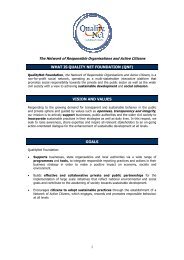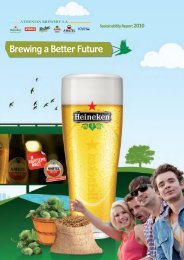APOLOGISMOS CCHBC final - Coca-Cola Hellenic
APOLOGISMOS CCHBC final - Coca-Cola Hellenic
APOLOGISMOS CCHBC final - Coca-Cola Hellenic
Create successful ePaper yourself
Turn your PDF publications into a flip-book with our unique Google optimized e-Paper software.
nvironment environment environment environment environment environment environment environment environment environment environment environment environment environment environment environment environm<br />
are reported on a quarterly basis. These figures<br />
are consolidated centrally and used for benchmarking.<br />
In addition, each production facility<br />
reports a multitude of data to The <strong>Coca</strong>-<strong>Cola</strong><br />
Company on an annual basis.<br />
Reporting standards are described in the internal<br />
document Good Environmental Practices on<br />
Environmental Reporting. The reporting process is<br />
audited during eKO System audits.<br />
Public reporting of environmental impact is made<br />
from time to time in line with the requirements of<br />
the ISO 14000 standards.<br />
Controlling<br />
Numerous internal and external audits take place<br />
at plant and country level. Environmentally relevant<br />
audits include those for ISO 14001 and for The<br />
<strong>Coca</strong>-<strong>Cola</strong> Company eKO system that will cover all<br />
bottling plants by mid 2004 (except Nigeria).<br />
Environmental due diligence audits are carried out<br />
prior to acquisitions, and Safety and Loss<br />
Prevention audits have been completed at 83% of<br />
<strong>Coca</strong>-<strong>Cola</strong> HBC plants.<br />
EFFECTIVE SYSTEMS FOR<br />
EFFICIENT STEWARDSHIP<br />
Consideration is given to improving economic and<br />
environmental aspects associated not only with<br />
the design, production and packaging of products,<br />
but also their transportation and ultimate disposal.<br />
Responsibility for this lies with the company’s<br />
Citizenship and Environmental Council comprising<br />
managers from a range of functional areas including<br />
Supply Chain, Quality Assurance, Risk<br />
Management, Public Affairs, Human Resources<br />
and General Management. The Council also has<br />
external representation from The <strong>Coca</strong>-<strong>Cola</strong><br />
Company and external consultancies and NGOs.<br />
The Council co-ordinates environmental affairs and<br />
discusses packaging and equipment design to<br />
obtain optimum impacts both up and downstream.<br />
For example, by working with our suppliers, the<br />
weight and quantity of material used in packaging<br />
has been significantly reduced and the efficiency of<br />
chilling equipment greatly increased.<br />
ENVIRONMENTAL MANAGEMENT<br />
SYSTEM VERIFICATION<br />
The environmental part of this report is verified by<br />
Denkstatt, an independent environment-counselling<br />
firm which has worked with The <strong>Coca</strong>-<strong>Cola</strong><br />
Company and has an in-depth knowledge of business<br />
in the beverage sector.<br />
DENKSTATT Umweltberatung und -management<br />
GmbH (DENKSTATT) were commissioned to provide<br />
a third party validation of the key performance<br />
indicator data (KPI) and EMS implementation<br />
progress data included in this report based on site<br />
visits and reviewing existing audit data from both<br />
internal and external sources. A summary of the<br />
key findings is as follows:<br />
1. The description of our business and environmental<br />
activities, commitment and progress is<br />
a fair description of the current reality.<br />
2. The environmental impacts and KPI's reported<br />
and included are those identified as being the<br />
most important, based on the companies specific<br />
business activities. The accuracy of the<br />
data collected by each operation is plausible<br />
and accurate and the traceability will become<br />
more effective as the EMS matures further.<br />
The ISO14001 implementation work at country<br />
level has made substantial progress given the<br />
aggressive and challenging targets for accreditation<br />
set by the company and should be used as an<br />
example to other multinational corporations.<br />
The company also remains focused on international<br />
priorities, NGO requirements and in-depth life<br />
cycle analysis (see <strong>Coca</strong>-<strong>Cola</strong> Beverages<br />
Environment Report 2002 (www.coca-colashop.ch/environment)<br />
which are monitored<br />
through the formation of a centralised Citizenship<br />
and Environmental Council.<br />
3. The data provided are coherent with the companies<br />
processes and spot-checks were carried<br />
out in 3 countries their selection being based<br />
from each of the three business development<br />
categories (established, developing and emerging)<br />
as well as an in depth review of environmental<br />
system audit data from several of the<br />
companies other operations<br />
4. The companies environmental organisation<br />
includes country Environmental Coordinators<br />
who are trained comprehensively. They actively<br />
develop the EMS (Environmental Management<br />
Systems), corrective action and continuous<br />
improvement plans in conjunction with senior<br />
operations management and are encouraged<br />
to exchange best practice ideas and experiences<br />
within the <strong>Coca</strong>-<strong>Cola</strong> HBC group.<br />
A copy of the report submitted by Denkstatt is<br />
available at www.coca-colahbc.com<br />
ENVIRONMENTAL STANDARDS<br />
The following environmental internal and external<br />
regulations are applicable to all <strong>Coca</strong>-<strong>Cola</strong> HBC<br />
Operations.<br />
The eKOsystem comprises the environmental<br />
management standards of The <strong>Coca</strong>-<strong>Cola</strong><br />
Company and is applicable to all bottling plants<br />
operating under its licence.<br />
There are Good Environmental Practice (GEP)<br />
manuals on Wastewater, Fleet Management,<br />
Managing Hazardous Materials, Ozone<br />
Protection, Measuring and Reporting<br />
Environmental Performance, Auditing<br />
Environmental and Safety Systems, and<br />
Environmental Due Diligence.<br />
The international standard ISO 14001 lists<br />
requirements for environmental management<br />
systems based on a continuous improvement<br />
process.<br />
All relevant local, national and (for EU members)<br />
European environmental legislation must<br />
be respected by each operation.<br />
ENVIRONMENTAL PERFORMANCE<br />
INDICATORS<br />
The <strong>Coca</strong>-<strong>Cola</strong> HBC environmental indicators are<br />
focussed on the environmental impacts that have<br />
been identified as being the most relevant to the<br />
company’s operations, and therefore within its<br />
scope of influence. Yearly figures are shown in the<br />
environmental data table.<br />
Materials<br />
Raw materials are used as ingredients for the<br />
company’s beverages, as constituents of packaging<br />
and as auxiliary materials in production<br />
processes. Because most of the environmental<br />
impacts in the use of raw materials actually occur<br />
in the supply chain, company suppliers are being<br />
required to be more and more involved in <strong>Coca</strong>-<br />
<strong>Cola</strong> HBC’s environmental endeavours.<br />
Ingredients<br />
The following are the main ingredients used. Yearly<br />
consumption figures are shown in the environmental<br />
data table.<br />
28<br />
29







